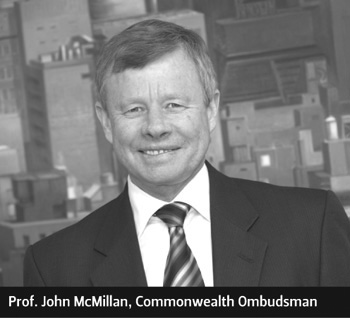Commonwealth Ombudsman Annual Report 2008-09 | Foreword
Foreword

There was increased activity in each of the Ombudsman's five key functions during 2008–09.
First, in complaint handling and investigation, the office received 45,719 approaches and complaints during the year—an increase of 14%. An investigation was conducted in 5,233 cases.
The main reason for this increase is the readiness of people to seek assistance from an independent office in resolving a problem with government. The public expects government officials to be competent and helpful, and are more ready to complain when mistakes occur or service standards decline.
Second, and partly in response, the Ombudsman's office devoted more attention to initiating own motion investigations into potential problem areas in public administration. Eighteen investigation reports were published in 2008–09—more than in any previous year.
A characteristic of those reports is that they deal with issues thrown up by individual complaints that point to more general problems in agency administration. A report can be an effective way of highlighting systemic weaknesses and prompting agencies to undertake administrative reform. During 2009–10 this program of own motion investigations will be extended, with a special focus on the investigation of complaint issues that arise in more than one agency.
Third, there has been a steady increase in the compliance auditing work of the office. In 2008–09 we conducted 30 inspections of the records of law enforcement and other agencies to ensure strict compliance with laws regulating telecommunications interception, electronic surveillance, controlled operations and access to stored communications. This compares to 10 inspections a year four years ago.
The purpose of these inspections is to provide reassurance to Parliament and the public that coercive and invasive law enforcement powers are lawfully invoked. If so, there is a greater readiness by the legislature to entrust those powers to agencies as an aid to the enforcement and administration of the law. We expect this trend to continue. For example, legislation was before the Parliament in the latter half of 2009 to require the Ombudsman to review the conduct of each examination conducted by the Fair Work Building Industry Inspectorate.
Fourth, the office has acquired additional specialist tasks that involve the monitoring or oversight of agency operations. Three ongoing functions that resulted in public reports were the audit of complaint handling by the Australian Federal Police; inspection of the records of the Australian Quarantine and Inspection Service relating to quarantine investigations; and the preparation of a report on each person held in immigration detention for more than two years (now six months).
Other monitoring activities during the year included unannounced visits to immigration detention centres; accompanying immigration, taxation and police officers on compliance operations; and regular visits to Christmas Island to oversight the reception and processing of illegal maritime arrivals.
The fifth function of the office is to promote good administration in Australian Government agencies. Considerably more emphasis was devoted to this function in 2008–09. The Ombudsman is uniquely placed to identify areas of administrative weakness, and to distil the lessons and principles that can improve standards of public administration. This led to the publication of a Better Practice Guide to Complaint Handling, seven fact sheets, three e-bulletins containing Ombudsman case studies, 19 submissions to parliamentary and other inquiries, and presentations by staff to over fifty conferences, seminars and workshops.
We will take this initiative a step further in 2009–10 by publishing a Better Practice Guide to Good Administration.
There was activity during the year on two other fronts. The office led the formation of a Pacific Ombudsman Alliance, to provide support for complaint handling in Pacific Islands Forum countries. The office hosted and visited Ombudsman staff from many of these countries. There was also an active outreach program of 219 visits to regional areas and capital cities in all Australian states and territories.
Turning to other matters, a special feature of this annual report, represented both on the cover and in Chapter 8, is that the Ombudsman institution celebrated its 200th anniversary in 2009. The first office designated as an Ombudsman office was established in Sweden in 1809. This was part of a constitutional settlement to end autocratic rule and recognise the right of citizens to lodge a grievance against government.
The International Ombudsman Institute held a conference in Stockholm in 2009 to mark this anniversary. Many of the 140 or more countries in which Ombudsman offices have been established participated in the conference. Most of the offices, including those in Australia, were established in the last 40 years.
The global expansion in Ombudsman work was a strong theme of the conference. This has paralleled a growth in the scale and complexity of government. The special role of the Ombudsman is to represent citizens in the affairs of government, not as an advocate but as an independent agency that can check whether laws and procedures are properly followed. This can redress the imbalance that exists between the powers and resources of government and the public.
The traditional mandate of the Ombudsman has not changed over 200 years, though many offices have broadened their horizons. Some have a special statutory role to seek protection for vulnerable groups in society, such as children, refugees, people in detention and those suffering mental illness. An added emphasis is also given by many offices to human rights values, social democratic objectives, and prevention of corruption in government.
Another theme picked up in the conference was the role that Ombudsman offices play in alternative dispute resolution. The quest for individual justice grows stronger in democratic countries, but this can be hampered by cost and legal formalities. The Ombudsman has proved to be an accessible and inexpensive justice forum for many people in dispute with government.
The Commonwealth Ombudsman's office is proud to play an active role in the international development of the Ombudsman institution. We believe that this trend makes a solid contribution to the development of integrity and transparency in government worldwide.
John McMillan
Commonwealth Ombudsman
